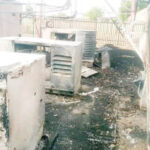
The rise in the price of fuel to 145 Naira a litre last week has been generating a debate on what should be the correct response. Historically, the response would have been straightforward. For the twenty times the price of petroleum products has been adjusted in the 30 years since the military administration of General Babangida broke the mould by raising the pump price of petrol from 3.15 kobo per litre to 20 kobo per litre in April 1985, the response has been demonstrations organised by labour and civil society.
The strategy has worked consistently and after the increase, quickly followed by demonstrations, government would reduce the level of increase, but almost never to the original amount. It’s a well-oiled routine and successive governments would raise it to an amount higher then they intended knowing they would eventually be forced to reduce the initial amount they announced.
We Nigerians have been so profoundly attached to a low price for petroleum that any time the low price regime is threatened, we are ready to go out and confront the government of the day. There is logic to our normal reaction, it is the one natural resource that we directly benefit from and who is a fool, we all want to continue benefitting from it.
In accordance with practice, the Nigeria Labour Congress (NLC), the Trade Union Congress of Nigeria (TUC) and the Civil Society Coalition called a press conference giving the government four days ultimatum to revert back to the original price or face massive protests starting Wednesday this week. As is usual with such notices, the coalition has advised Nigerians to stock up on supplies because offices, markets and schools would remain closed for the period of the strike. This time, I would not be on the barricades, as I am not convinced repeating the habitual approach is the best way to proceed.
I believe that President Buhari is fundamentally opposed to increasing the cost of petrol and that circumstances beyond the control of government has forced the increase. I know that the ruling party put a lot of pressure on him to remove fuel subsidy in his first month in office and use the savings for social projects but he stubbornly refused. His reason was that he did not want the suffering of Nigerians to increase. It is interesting that other governments with a track record on sustaining a cheap fuel price regime have also succumbed to pressure so the Buhari Administration is not the only one.
The Venezuelan government that has not increased the fuel price for twenty years has just raised it by 6,000%. Saudi Arabia has raised the price of petrol by 40% and Qatar by 30%. In Nigeria the decline in oil revenues coinciding with a drastic decline in quantities exported due to sabotage has created a situation in which raising prices becomes necessary except if we choose to sacrifices other essentials.
This time round, the affiliate unions in the oil sector, NUPENG and PENGASSAN came out to endorse the increase in the price of petrol and may not be on the same wavelength with the NLC and the TUC. The oil sector unions may eventually align with the labour centres but if the do, they might not have a lot of enthusiasm. In fact, the NLC President, Ayuba Wabba had admitted that the NLC, TUC and other civil society allies were not unaware of the positions taken by the unions in the Oil and Gas Industry but hinted that there was an on-going engagement process to get them on board.
I am sympathetic with the reasons advanced for the strike. Nigerians are really suffering at this time with unpaid wages, rising inflation, lack of electricity and water. For a long time, the take home pay of workers simply cannot sustain them so ordinarily; adding transport costs to an already tight situation is not the best. In addition, during his campaigns last year, President Mohammadu Buhari had pledged that if elected, his administration would not remove fuel subsidy. For the suffering masses, it is not enough to say that the President had resisted the pressure to increase the price for almost one year. At the beginning of the year, Nigerians had been reassured with a slight decrease of the price of petrol to N86.50k per litre. The current increase has therefore dashed hopes and some people are beginning to believe that they have been deceived.
Given the difficult situation we find ourselves in, I believe Government should reach out to all Nigerians and explain in greater detail the reasons that have led to this increase.
Nigerians for their part should remember that when the January first 2012 increase occurred and Nigerians poured out into the streets to occupy their land, a lot of the anger was related to the massive corruption that was crippling the country. The key demands made at that time were on combatting deep-seated regime corruption, in addition to the core demand for reverting to the original price. President Jonathan did warn Nigerians at that time that the corruption was inherent in the subsidy regime and no one can maintain subsidy without sustaining the corruption. President Buhari was clearly determined to clean up the system but the persistence of shortages, long queues in spite of the return of subsidy may well be an indication that Jonathan was right, at least on that point. No one has so far gone to jail for the mega looting of trillions of Naira of subsidy payments over the past five years. Maybe our efforts should be directed at getting all those who have been emptying our treasury through fuel subsidy scams to go directly to jail. Meanwhile, we Nigerians will remain committed to a regime of cheap fuel so Mr. President, when the economy improves, please remember our desire.



